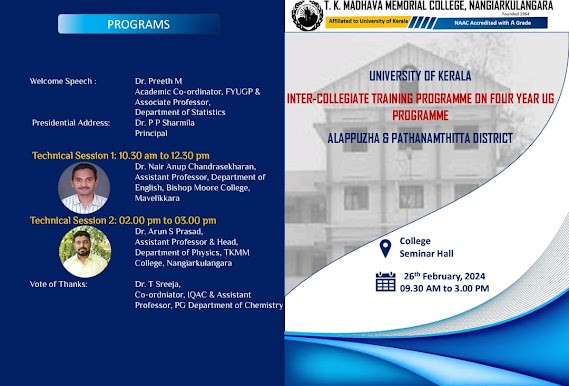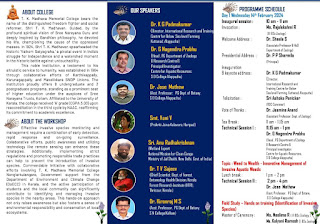Three day National
Workshop on 'Invasive Species -
Monitoring and Management'
Funded by Department
of Environment and Climate Change, Govt. of Keralam
Organized by
Department of Zoology
Dates: 14th,
16th and 19th February, 2024
Invasive species pose a significant threat to
ecosystems worldwide, often outcompeting native species and disrupting natural
habitats. Recognizing the critical need to address this issue, the Department
of Zoology organized a three-day workshop on ‘Invasive Species: Monitoring
and Management.’ This workshop, funded by the Department of Environment and
Climate Change, aimed to equip participants with the knowledge and skills
necessary to identify, monitor, and effectively manage invasive species in
their respective regions.
One of the key highlights of the workshop was
the emphasis on practical learning. Participants were given the opportunity to
apply their knowledge in real-world scenarios, conducting field surveys to
identify invasive species, assess their impact, and develop management
strategies tailored to specific environments. Moreover, the workshop served as
a platform for networking and collaboration among participants from diverse
backgrounds. This interdisciplinary approach fostered the exchange of ideas and
best practices, paving the way for future collaborations in invasive species
management.
The workshop was formally inaugurated by Dr.
K.G. Padma Kumar, Director, International Research and Training Centre for
Below Sea level Farming, Kuttanad, Alappuzha district. The inaugural function
was presided over by the Principal of TKMM College, Dr. P.P. Sharmila. The
event began with a prayer song chanted by student of III B.Sc, student, Ms.
Rajalekshmi R. It was followed by welcome speech by the Coordinator of the
Workshop and Head, Department of Zoology, Associate professor Dr. Sheela S.
.jpeg)
.jpeg)
.jpeg)
.jpeg)
After presidential address by the Principal,
the programme was felicitated by Sri. Ashoka Panicker, Convener of RDC, College
Management. Thereafter, an absorbing Keynote Address was delivered by Dr. K.G. Padma
Kumar where the well- known agricultural scientist unleashed significant
memories of his career for the benefit of student folks. Environmental issues
like Spirulina bloom in temple ponds, undesirable population of the BGM
Microcystis in Kuttanad, effect of Salvinia and Cabomba in BoD of our public water
bodies etc were detailed.
In the absence of Dr. Jasmine Anand, Assistant
Professor of Zoology, who was supposed to convey vote of thanks, Dr. Vinod
Haridas, Associate Professor and Head, department of Botany thanked the
inaugural session. After a short tea break, where oil free indigenous snacks
were distributed, first technical session by Dr. G. Nagendra Prabhu, Head, PG
Department of Zoology and Research Centre, S.D. College, Alappuzha, began at
11.30 AM.
Dr. Prabhu elaborated umpteen ways to tackle
the most disturbing and invasive water weed, Eichhornia crassipes. He
had brought with him samples of organic products made of processed water
hyacinth of which wedding cards, art works, brickets, dye extracted from its
blooms etc are a few to name. The session was a classical example of dealing
positively with an undesirable invasive menace that chokes our water bodies.
.jpeg)
.jpeg)
.jpeg)
.jpeg)
After lunch, students were taken to a neighbouring abandoned piece of land
now owned by NTPC where the next resource person, Dr. Jose Mathew, a young and
dynamic taxonomist and Assistant Professor of Botany from S.D. College
Alappuzha, gave hands on training to student participants in identification of
invasive plant species. In order to tackle the scorching sun, delegates were
provided with vehicle conveyance, snacks and water. Eleven plant species of invasive nature like Chromolaena odorata (Communist Pacha), Mikania
micrantha (Dritharashtra pacha), Pistia stratiotes (Mutta payal), Lantana
camara (Arippoochedi), Urena lobata (Uram uthiram) etc were found to
dwindle and sideline indigenous ones viz, Persea macrantha (Kulamaav), Scoparia
dulcis (Kallurukki), Abutilon hirtum (Oorpam) etc.
.jpeg)
.jpeg)
.jpeg)
Followed by lunch, afternoon class of this National Workshop on 16th
February was led by Sri. Anu Radhakrishnan,Wetland expert at National Mission
for Clean Ganga, Ministry of Jal Shakthi, NEW DELHI. Govt. of India. He spoke
on the very relevant topic,’ Solutions for Monitoring and managing Invasive
species in Wetlands as well as in allied landscapes’. With this absorbing
discourse, the second day was curtained, leaving lots of relevant information
in the scribbling pad provided to delegates.
Third and final day came after a weekend on
19.2.2024, and began with an in-house session by Dr. Radhakrishnan, Assistant
Professor at School of Biosciences, Mahatma Gandhi University, Kottayam. He
delivered a talk on the impact of microbes on aggressive nature of invasive
plants.
Towards the afternoon, another field study was
done in discrete spots of the college campus which was guided by eminent
taxonomist Dr. Kiranraj M.S, Assistant Professor of Botany, S.N. College,
Kollam. He is a consultant and an expert in identification of Monocots of
Western Ghats. Once again, burning sun was ignored when the scientist got the
audience engaged in identifying as much as 21 invasive weeds including Calapogonium
mucunoides (Valiya thottapayar), Centrosema molle (Cheru
thottapayar), Ipomea triloba (chutti thiruthali), Panicum repens
(Torpedo grass), Pennisetum polystachion (Poochavaalan pullu), Merremia
tridentata (Prasarini / loud speaker) etc.
The whole programme strictly adhered to green
protocol which was apparently evident in the following gestures:
1.
All the welcome bouquets presented to resource persons were made
of banana heart wrapped in amaranthus as
rosette tied with jute fibre.
2.
The workshop ID card was made frompalm leaves sheath.
3. Disposable glasses
were totally avoided for serving tea and was replaced with steel glasses.
4. Tea/water costers
were prepared from plantain leaf cut to size with midrib as weight support
5. Programme display banners were made of
cloth to avoid vinyl flex.
6. Snacks provided were oil free and steam
baked.
7. Dust bin was spun out of Reed bamboo
strips.
Nearly 200 participants from within and
neighbouring colleges learnt methods of management and stage wise eradication
of invasive herbs to protect the diminishing native medicinal plants under
supervision of invited apposite resource persons with proven expertise in the
relevant fields. We at the department of Zoology and Botany, T.K. Madhava
Memorial College, are grateful to the DoECC, Government of Keralam, for
providing funds towards the successful completion of the three day National
event. The student participants of the department deserve whole hearted
appreciation for making this venture a grand success.
Outcome:
The workshop aimed to tackle the issue of adamant invasive
weeds, primarily exotic species. Field observations revealed that approximately
80% of herbs on campus and nearby abandoned lands belonged to this category.
Through direct analysis in the natural environment, students were initiated to
devise plans and projects to eradicate these invasive species gradually and
monitor their future growth.
Furthermore, a book titled "A
Compendium on Non-native Organisms of India" is currently in press,
which will likely provide valuable insights into identifying and managing
invasive species in the country.


.jpeg)

.jpeg)
.jpeg)


.jpeg)
.jpeg)

.jpeg)
.jpeg)

.jpeg)


.jpeg)
.jpeg)
.jpeg)
.jpeg)
.jpeg)
.jpeg)
.jpeg)
.jpeg)
.jpeg)
.jpeg)
.jpeg)
.jpeg)
.jpeg)
.jpeg)
.jpeg)
.jpeg)
.jpeg)
.jpeg)
.jpeg)



















